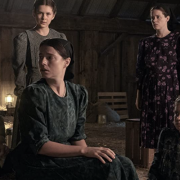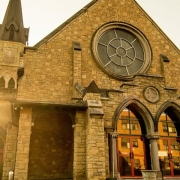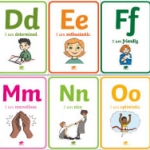What does complementarianism have to do with Domestic Violence Awareness Month?
This article originally appeared on October 6, 2022 at Baptist News Global.
“Please don’t tell my husband I said anything. These men think they can bully women into submission.”
I hear statements like this from Christian women in complementarian marriages quite often. But while many of these women are aware of the weight they bear, they choose to remain in obedience and service to their husbands.
Other women consider it an honor to take part in male-dominated hierarchies. Like the wives of Gilead in Margaret Atwood’s The Handmaid’s Tale, they accept their role, look the other way, and respond to whatever their husband decides with, “Praise be.” Some of them may even be allowed to write articles or books for conservative evangelical media outlets to support the power of men.
But many Christian women have an intuition that something is not right in their marriages, even though they may not be able to put a finger on what it is or know how to respond to the theology supporting it.
So one of the most significant challenges Christian women face today is recognizing and dealing with the abuse they experience.
Domestic Violence Awareness Month
In October 1981, the National Coalition Against Domestic Violence began the “Day of Unity” to bring together abuse victim advocates from across the country. As it evolved into a week of events, it garnered national attention. In October 1987, it became a monthlong focus. And then in October 1989, the U.S. Congress officially designated October as National Domestic Violence Awareness Month.
“One in three women and one in four men have been physically abused by an intimate partner.”
According to the National Child Traumatic Stress Network, “One in three women and one in four men have been physically abused by an intimate partner.” If that many women are suffering physical abuse, imagine how many are dealing with emotional or spiritual abuse that has been sacralized by theology.
Sacralizing male dominated hierarchies
The difficulty in recognizing domestic violence in Christian marriages is due to how it comes clothed in language about Christ and the church. Complementarian men are compared to Christ, while women play the role of the church who obeys and serves Christ.
Of course, they can claim the men must love their wives in accordance with Ephesians 5. But they fail to see how the Ephesians 5 household codes of husbands and wives, fathers and children, masters and slaves were culturally situated hierarchy shells discussed within the Greco-Roman empire — codes the author of Ephesians was deconstructing and opening up toward mutual submission and love.
Instead, today’s complementarians use the gospel to position women in a lower place of authority, autonomy and opportunity simply based on their identity as women.

Sarah McDugal
Sarah McDugal is an author, coach and abuse survivor who helps Christian women identify and deal with systemic abuse in their marriages. She has created a free chart and crash course for Domestic Violence Awareness Month that helps Christian women recognize the red flags of abuse.
In an interview with Baptist News Global, McDugal gave her three-pronged definition of abuse as:
- A mindset of entitlement to coercion.
- A system of beliefs that allow power to limit liberty.
- A pattern of behaviors that harm or exploit.
When we compare gender hierarchies to McDugal’s definition of abuse, we see that complementarianism is:
- A mindset of entitlement where men are obeyed and served by women.
- A system of beliefs that allow men the power to limit and determine what women are permitted to do.
- A pattern of behaviors that harm and exploit women by lowering their identity and controlling what they can do.
“There is no healthy complementarianism.”
There is no healthy complementarianism. It is by definition an entitlement-based, power-driven exploitation of women simply because they’re women.










Leave a Reply
Want to join the discussion?Feel free to contribute!